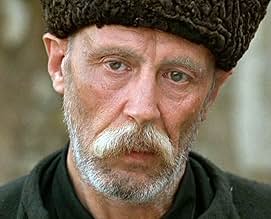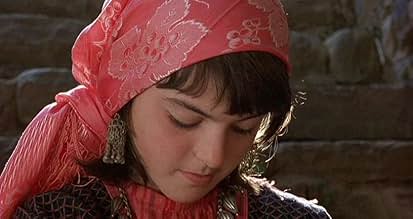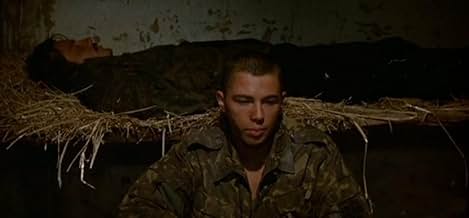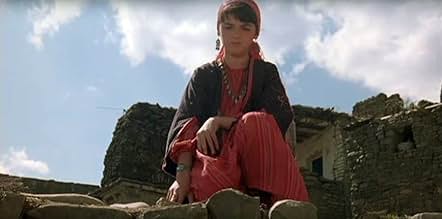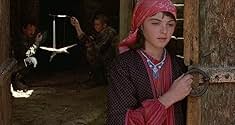VALUTAZIONE IMDb
7,5/10
4876
LA TUA VALUTAZIONE
Aggiungi una trama nella tua linguaTwo Russian soldiers, one battle-seasoned and the other barely into his boots and uniform, are taken prisoner by an anxious Islamic father from a remote village hoping to trade them for his ... Leggi tuttoTwo Russian soldiers, one battle-seasoned and the other barely into his boots and uniform, are taken prisoner by an anxious Islamic father from a remote village hoping to trade them for his captured son.Two Russian soldiers, one battle-seasoned and the other barely into his boots and uniform, are taken prisoner by an anxious Islamic father from a remote village hoping to trade them for his captured son.
- Regia
- Sceneggiatura
- Star
- Candidato a 1 Oscar
- 14 vittorie e 7 candidature totali
Recensioni in evidenza
There are probably a lot of prejudices people have against Russian film. Mine were gone after I had seen this one.
"Kavkazskij plennik" is a film about a youth who's being sent to Chechnya to fight for the Russian army. He's together with another Russian soldier being captured in Chechnya by an older Chechnyan man who wants to change them for his own son, who's is being held by the Russians. There being locked into an old house high among the Caucasian mountains. Soon a friendship develops between them and young girl who brings them food and water.
This movie was made after and during the last months of the first Chechnyan war. Everybody's a victim and there is nothing to win in this war, specially for the Russians. It is just a matter of how much you lose. The persons in this film do not hate each other because their fighting on different sides. The Chechnyans probably hates what these Russian soldiers represent, but they know that this war isn't caused by these two Russians. They are both just a small, meaningless part of it. Russia does not give a damn about their lives, probably because it's leaders have lost the humane touch, while calculating their offensives. Lives have been reduced into numbers on white sheet. But there are people who care, even among the "enemies". Normal people still show respect for humanity.
The rhythm of the movie is great, it leaves the viewer enough time to think and also find the deeper thoughts from the movie. The music is well selected too, I just cant get that tune out of my head. This together with a realistic humane aspect gives this movie a strong pacifistic tune. Definitely worth to take a look at.
"Kavkazskij plennik" is a film about a youth who's being sent to Chechnya to fight for the Russian army. He's together with another Russian soldier being captured in Chechnya by an older Chechnyan man who wants to change them for his own son, who's is being held by the Russians. There being locked into an old house high among the Caucasian mountains. Soon a friendship develops between them and young girl who brings them food and water.
This movie was made after and during the last months of the first Chechnyan war. Everybody's a victim and there is nothing to win in this war, specially for the Russians. It is just a matter of how much you lose. The persons in this film do not hate each other because their fighting on different sides. The Chechnyans probably hates what these Russian soldiers represent, but they know that this war isn't caused by these two Russians. They are both just a small, meaningless part of it. Russia does not give a damn about their lives, probably because it's leaders have lost the humane touch, while calculating their offensives. Lives have been reduced into numbers on white sheet. But there are people who care, even among the "enemies". Normal people still show respect for humanity.
The rhythm of the movie is great, it leaves the viewer enough time to think and also find the deeper thoughts from the movie. The music is well selected too, I just cant get that tune out of my head. This together with a realistic humane aspect gives this movie a strong pacifistic tune. Definitely worth to take a look at.
Prisoner of the Mountains provides an inside look into the Russia/Chechnya conflict through the eyes of two captured Russian soldiers, Vania and Sacha. The unlikely duo forms a friendship out of their will to escape their imprisonment. Despite the serious basis for the story (the continuing war between the two countries), the film is very multifaceted in that it contains comedy, love, and suspense. In this respect, I greatly disagree with another user who described the film as `bleak, tedious, and uneventful.' The main reason this film succeeds is that it does not only focus on the war and battles between the two sides, but rather develops the underside of the conflict-the characters on both sides.
This user likens this film to watching polar bears sleeping because violence only makes up ten per cent of the plot. I have seen movies that are as boring as this analogy. Prisoner of the Mountains does not qualify as this type of film. Bodrov incorporates many different types of scenes in the plot action that evoke a variety of emotions from the audience. There are serious scenes, such as when Sacha and Vania are captured, which elicit fear and apprehension in the viewer. In contrast, there are also more humorous scenes, as in when Vania continues to meddle with the gun he and Sacha stole, after Sacha warns him to be careful, and the gun fires, causing them to lose their only bullet. In this respect, Bodrov makes his film very well-rounded by incorporating various types of scenes that play to different emotions. While the central plot is serious in its portrayal of the war, Bodrov includes less intense scenes in order make the film more interesting and develop the personalities of the characters. The scenes in which Vania and Sacha are shown `getting drunk, whittling, chatting with passers-by, and making friends with their captors' serve to help the audience understand the backgrounds of all of the characters, as well as show character transformation. Through discussions between the two soldiers, the audience discovers that Sacha's at first exterior most likely results from the fact that he is an orphan. In time, we see how Sacha grows to respect Vania, despite his naive nature, and becomes a father-figure to the younger soldier, ultimately sacrificing his life for him. Moreover, we learn how Dina grows fond of Vania and ultimately defies her father to help him escape. In this respect, these scenes are the main point of the movie. In this viewer's desire to see violence, I think he missed the obvious. Bodrov wants the viewer to understand the feelings and motivations of characters on both sides of the conflict. Had the film shown one battle after another, the audience would not have been able to understand the characters because only fighting would have been shown. In this respect, the non-violent scenes are critical to character development as well as the overall impact of the film on the audience.
While violence is the setting for the film, it is not meant to be the sole focus of the plot. Consequently, rating this film based on its lack of violence does not do it justice because violent scenes purposely comprise only a part of the action. This reaction would be similar to evaluating a straight play, which had a few musical numbers, as if it were a musical; you would obviously be let down and give it poor marks because your expectations would be too high. In this way, I do not feel that more violent scenes would have added anything to this film. Bodrov sought to illustrate the general tense atmosphere of the situation through the initial capture of the soldiers, the failed escape of the soldiers, the death of Abdoul's son and the expected shooting of Vania. These incidences of violence effectively convey the difficult environment to the audience. Additional killing would have been gratuitous in light of Bodrov's main emphasis of character development. Overall, I found this film to be incredibly engaging and interesting for its depiction of the bitter conflict between the two countries. As a westerner, I can say that the scenery was nice, but that it was not the only good aspect of the film as this viewer states. Perhaps the name and subject of this film is misleading. To a person who wants to see a lot of violence in films, Prisoner of the Mountains would not be my first recommendation. To this viewer, I would suggest The Betrayed, another film on the Russian/Chechnya conflict with significant violent footage. In forming impressions of films, it is important to take into consideration why the director made the film as he/she did. In this instance, it is clear that Bodrov did not only want to present the violent nature of the war, but that he desired to explore the individuals behind the conflict.
This user likens this film to watching polar bears sleeping because violence only makes up ten per cent of the plot. I have seen movies that are as boring as this analogy. Prisoner of the Mountains does not qualify as this type of film. Bodrov incorporates many different types of scenes in the plot action that evoke a variety of emotions from the audience. There are serious scenes, such as when Sacha and Vania are captured, which elicit fear and apprehension in the viewer. In contrast, there are also more humorous scenes, as in when Vania continues to meddle with the gun he and Sacha stole, after Sacha warns him to be careful, and the gun fires, causing them to lose their only bullet. In this respect, Bodrov makes his film very well-rounded by incorporating various types of scenes that play to different emotions. While the central plot is serious in its portrayal of the war, Bodrov includes less intense scenes in order make the film more interesting and develop the personalities of the characters. The scenes in which Vania and Sacha are shown `getting drunk, whittling, chatting with passers-by, and making friends with their captors' serve to help the audience understand the backgrounds of all of the characters, as well as show character transformation. Through discussions between the two soldiers, the audience discovers that Sacha's at first exterior most likely results from the fact that he is an orphan. In time, we see how Sacha grows to respect Vania, despite his naive nature, and becomes a father-figure to the younger soldier, ultimately sacrificing his life for him. Moreover, we learn how Dina grows fond of Vania and ultimately defies her father to help him escape. In this respect, these scenes are the main point of the movie. In this viewer's desire to see violence, I think he missed the obvious. Bodrov wants the viewer to understand the feelings and motivations of characters on both sides of the conflict. Had the film shown one battle after another, the audience would not have been able to understand the characters because only fighting would have been shown. In this respect, the non-violent scenes are critical to character development as well as the overall impact of the film on the audience.
While violence is the setting for the film, it is not meant to be the sole focus of the plot. Consequently, rating this film based on its lack of violence does not do it justice because violent scenes purposely comprise only a part of the action. This reaction would be similar to evaluating a straight play, which had a few musical numbers, as if it were a musical; you would obviously be let down and give it poor marks because your expectations would be too high. In this way, I do not feel that more violent scenes would have added anything to this film. Bodrov sought to illustrate the general tense atmosphere of the situation through the initial capture of the soldiers, the failed escape of the soldiers, the death of Abdoul's son and the expected shooting of Vania. These incidences of violence effectively convey the difficult environment to the audience. Additional killing would have been gratuitous in light of Bodrov's main emphasis of character development. Overall, I found this film to be incredibly engaging and interesting for its depiction of the bitter conflict between the two countries. As a westerner, I can say that the scenery was nice, but that it was not the only good aspect of the film as this viewer states. Perhaps the name and subject of this film is misleading. To a person who wants to see a lot of violence in films, Prisoner of the Mountains would not be my first recommendation. To this viewer, I would suggest The Betrayed, another film on the Russian/Chechnya conflict with significant violent footage. In forming impressions of films, it is important to take into consideration why the director made the film as he/she did. In this instance, it is clear that Bodrov did not only want to present the violent nature of the war, but that he desired to explore the individuals behind the conflict.
Prisoner of the Mountains is an excellent movie. Vanya a young recruit , and Sasha a veteran soldier in the Russian army are captured after an ambush by the Chechens. The Chechen leader keeps them to trade for his son who is captured by the Russians. Then a friendship develops between the Chechens, and the two Russians. I study Russian in college, and even though the subtitles aren't very accurate at times it still helps. The whole plot is just amazing. It shows the human side of soldiers. I definitly recommend this movie to anyone who hasn't seen it.
10mozibuzi
In this film, I can find almost everything what I like in a movie. It presents the life of a small community, their thoughts, their feelings and their habits. It has a nice atmosphere, beautiful sights, good actors, and a strong story. What else do you want? Another reason to love Russian movies.
I liked this movie very much. It showed the human side of war. It is a compelling view of life during wartime, as seen through the eyes of a handful of individuals, each with his own perspective and agenda. The story is a warm, sometimes depressing, but ultimately hopeful look at human nature at it's best, and worst.
Lo sapevi?
- QuizThe film was shot within 20 miles of actual battles then occurring between Russians and Chechens. Local Muslim guerrillas served as bogyguards for the cast and crew. The film tells the story of two prisoners of war, but truth is stranger than fiction: when the guerrillas found out that amateur actress Susanna Mekhraliyeva was paid for her job in U.S. dollars they took the whole film crew prisoner! Her salary was soon changed for Russian rubles and the shooting continued as if nothing had happened.
- BlooperAfter Sacha and Vanya escape and remove the shackles from their ankles, they begin running upstream. The scene cuts to a different angle, and they are running downstream.
- Citazioni
Sacha Kostylin: I am dead, but I like it. Everything is peaceful now.
- ConnessioniFeatured in 54th Golden Globe Awards (1997)
I più visti
Accedi per valutare e creare un elenco di titoli salvati per ottenere consigli personalizzati
- How long is Prisoner of the Mountains?Powered by Alexa
Dettagli
Botteghino
- Lordo Stati Uniti e Canada
- 790.078 USD
- Fine settimana di apertura Stati Uniti e Canada
- 17.205 USD
- 2 feb 1997
- Lordo in tutto il mondo
- 921.886 USD
Contribuisci a questa pagina
Suggerisci una modifica o aggiungi i contenuti mancanti

Divario superiore
By what name was Il prigioniero del Caucaso (1996) officially released in India in English?
Rispondi


